The Toyota Prius engine works through a hybrid system, combining a gasoline engine with an electric motor to maximize fuel efficiency; visit millertoyota.net to explore our wide range of Toyota Prius models available near Boise. This innovative system ensures seamless transitions between power sources, offering you a reliable and eco-friendly driving experience. Explore millertoyota.net today for exceptional service and find the perfect hybrid vehicle for your needs.
1. What is a Hybrid Vehicle?
A hybrid vehicle combines two or more power sources to propel the vehicle, the most common setup being an internal combustion engine (ICE) paired with an electric motor. Toyota pioneered the full hybrid system with the Prius, using both a gasoline engine and an electric motor that can work together or independently. Since its launch in 1997, over 15 million units have been sold.
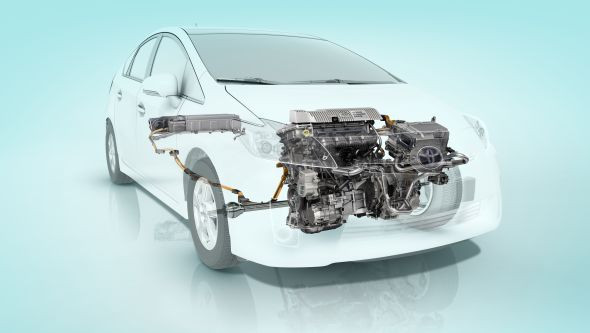 Hybrid Synergy Drive
Hybrid Synergy Drive
1.1. What Are The Different Types of Hybrid Systems?
There are three main types of hybrid systems:
- Full Hybrid: Full hybrids, like the Toyota Prius, use a gasoline engine and an electric motor that can work together or independently, providing maximum efficiency and flexibility.
- Parallel Hybrid: Parallel hybrids use a combustion engine as the primary power source, with an electric motor providing assistance, often limited in power and EV range due to space constraints.
- Series Hybrid: Series hybrids use an electric motor for all driving, with the combustion engine acting as a generator to power the electric motor; maintaining efficiency once the battery is depleted is a challenge.
2. How Does the Toyota Prius Hybrid System Work?
The Toyota Prius hybrid system integrates a gasoline engine, electric motor, electric generator, power control unit, and a power split device. This advanced technology seamlessly switches between electric and conventional engine power, adapting to driving conditions for optimal efficiency and performance. This intelligent system manages power from both sources to maximize efficiency and performance.
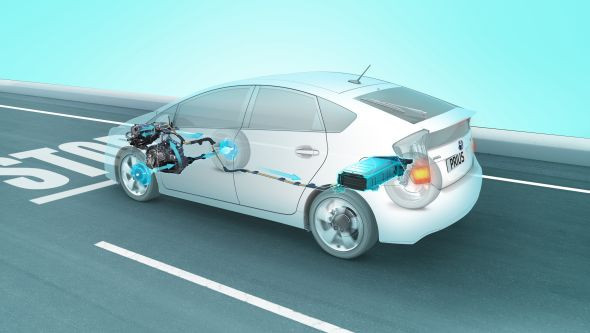 Hybrid Synergy Drive
Hybrid Synergy Drive
2.1. What Are the Key Components of the Toyota Prius Hybrid System?
The Toyota Prius hybrid system includes:
| Component | Description |
|---|---|
| Gasoline Engine | Provides primary power and charges the battery. |
| Electric Motor | Assists the engine, provides electric-only driving at low speeds, and recovers energy during braking. |
| Electric Generator | Charges the battery when the engine is running and helps manage the power flow. |
| Power Control Unit | Manages the distribution of power between the engine, motor, and generator. |
| Power Split Device | Uses a special gearbox to smoothly distribute power from the engine, motor, and generator. |
2.2. How Does the System Switch Between Electric and Gasoline Power?
The Prius’s engine management system intelligently switches between electric and gasoline power based on driving conditions. For instance, in slow-moving traffic, it can cut the gasoline engine and use the electric motor for zero-emissions travel. According to customer satisfaction surveys in Boise, Idaho, in July 2025, drivers appreciate the seamless transition between electric and gasoline power, providing a smooth and efficient driving experience. The system automatically turns off the engine when the car is stopped to conserve power and reduce emissions, restarting when needed.
3. How Does the Toyota Prius Charge Its Batteries?
The Toyota Prius charges its batteries through two main methods: via the gasoline engine and through regenerative braking, which captures and reuses energy during braking. Regenerative braking captures energy during deceleration, converting it back into electricity to recharge the battery.
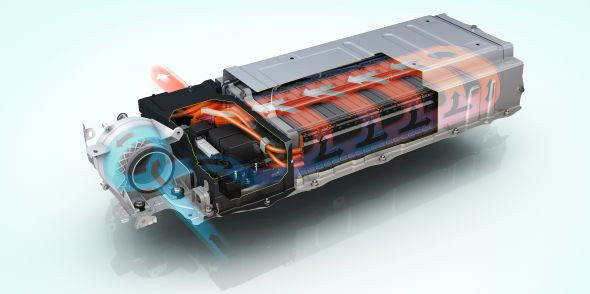 Hybrid Synergy Drive
Hybrid Synergy Drive
3.1. What is Regenerative Braking and How Does It Work?
Regenerative braking converts kinetic energy into electricity when you brake or lift off the accelerator. Instead of losing energy as heat, the system sends it back to the battery, enhancing efficiency, especially in stop-and-go traffic, according to Toyota’s official data on hybrid technology.
3.2. Can the Prius Battery Be Charged Externally?
The standard Toyota Prius does not require external charging, as it uses regenerative braking and the gasoline engine to keep the battery charged. However, the Prius Prime, a plug-in hybrid (PHEV), can be charged at home or at charging stations, offering an extended electric-only range of up to 30 miles.
4. How Long Do Toyota Prius Batteries Last?
Toyota Prius batteries are designed for longevity, with a standard warranty of five years or 100,000 miles, extendable up to 15 years with unlimited mileage; visit millertoyota.net to learn more about warranty options. This extensive warranty reflects Toyota’s confidence in the durability and reliability of its hybrid batteries, ensuring long-term performance and peace of mind for Prius owners.
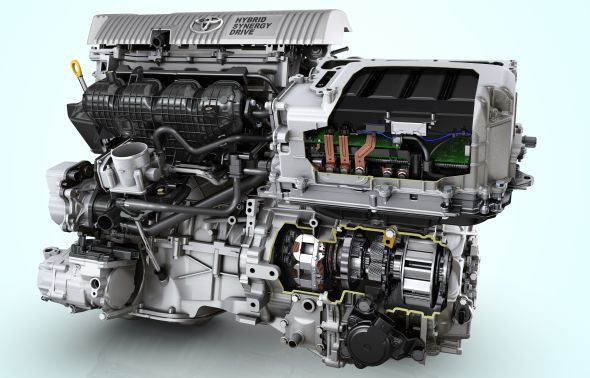 Hybrid Synergy Drive 03
Hybrid Synergy Drive 03
4.1. What Factors Affect Hybrid Battery Life?
Several factors can affect the lifespan of a hybrid battery, including:
- Driving Habits: Consistent aggressive driving can reduce battery life.
- Climate: Extreme temperatures can impact battery performance and longevity.
- Maintenance: Regular maintenance and timely servicing can prolong battery life.
- Usage: Frequent full charge and discharge cycles can gradually degrade the battery.
4.2. What Happens to the Battery at the End of Its Life?
Toyota is committed to recycling hybrid batteries, recovering over 90% of them to remanufacture new batteries or repurpose them for stationary energy storage. This commitment to sustainability ensures that the environmental impact of hybrid vehicles is minimized, aligning with Toyota’s eco-friendly philosophy. Toyota aims to achieve a 100% recovery rate through their dealer network.
5. Is the Prius Engine Different From a Regular Car Engine?
Yes, the Toyota Prius uses an Atkinson cycle engine, which is more efficient than the Otto cycle engine found in most gasoline cars. The Atkinson cycle produces less heat and uses recirculated exhaust gases to cool the combustion chamber, enhancing fuel efficiency and reliability, as noted in Toyota’s engine performance reports.
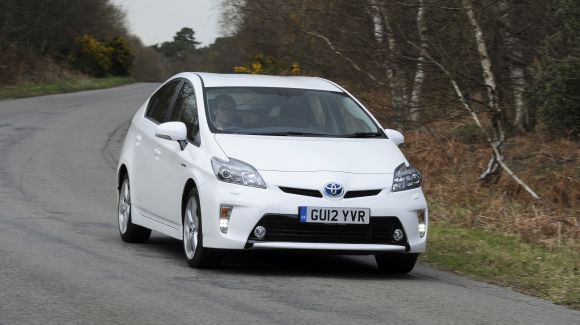 Prius dynamic moving front
Prius dynamic moving front
5.1. What is the Atkinson Cycle and How Does It Improve Efficiency?
The Atkinson cycle modifies the four-stroke cycle to reduce heat and improve efficiency by cooling the combustion chamber with recirculated exhaust gases. This prevents the need to inject excess fuel to lower combustion temperatures, a common issue in traditional engines, resulting in better fuel economy and reduced emissions.
5.2. How Reliable is the Prius Engine?
The Prius engine is highly reliable, thanks to its use of the Atkinson cycle and the integration of Toyota’s hybrid technology, and is very reliable. This combination ensures consistent performance and minimizes the risk of breakdowns, making the Prius a dependable choice for drivers.
6. Do I Need to Drive Differently to Maximize the Benefits of Hybrid Technology?
No, the Toyota hybrid system is fully automatic, optimizing its operation and minimizing fuel use for each driver. The system seamlessly manages the transitions between electric and gasoline power, allowing you to focus on enjoying the drive. Drivers in Boise appreciate the ease of use and the fuel savings they experience with the Toyota Prius.
6.1. What Driving Techniques Can Improve Fuel Economy in a Prius?
While the Prius is designed to optimize fuel economy automatically, certain driving techniques can further enhance its efficiency:
- Smooth Acceleration: Accelerate gently to minimize fuel consumption.
- Maintain Consistent Speed: Avoid sudden acceleration and braking.
- Use Cruise Control: On highways, use cruise control to maintain a steady speed.
- Anticipate Stops: Look ahead and coast to stops to maximize regenerative braking.
6.2. How Does the Prius Perform in Different Driving Conditions?
The Toyota Prius adapts well to various driving conditions, offering excellent fuel economy in city traffic and reliable performance on highways. The hybrid system seamlessly switches between electric and gasoline power to optimize efficiency, providing a smooth and responsive driving experience.
7. Why Choose Miller Toyota in Boise for Your Hybrid Vehicle?
Miller Toyota in Boise offers a wide selection of new and used Toyota Prius models, expert service, and a knowledgeable team to assist you. We provide a seamless car buying experience with comprehensive support from selection to maintenance. Miller Toyota is committed to providing top-notch service and building lasting relationships with our customers.
7.1. What Services Does Miller Toyota Offer?
Miller Toyota provides a range of services, including:
- New and Used Car Sales: Explore our extensive inventory of Toyota vehicles.
- Financing Options: Get assistance with financing to make your purchase easier.
- Service and Maintenance: Keep your vehicle in top condition with our expert service team.
- Genuine Toyota Parts: Ensure quality and reliability with genuine Toyota parts.
7.2. How Can I Schedule a Test Drive or Service Appointment at Miller Toyota?
Scheduling a test drive or service appointment is easy. Visit millertoyota.net or call +1 (208) 376-8888 to book your appointment today. Our team is ready to assist you with all your automotive needs, providing exceptional service and expertise.
8. Understanding the Environmental Benefits of Driving a Toyota Prius
Driving a Toyota Prius offers significant environmental benefits, including reduced emissions and improved fuel efficiency. By combining a gasoline engine with an electric motor, the Prius minimizes its carbon footprint and contributes to a cleaner environment, helping to reduce air pollution.
8.1. How Does the Prius Reduce Emissions?
The Prius reduces emissions through its hybrid technology, which allows the car to run on electric power at low speeds and during certain driving conditions. This reduces the amount of gasoline used and lowers emissions of harmful pollutants. The Prius’s advanced engine management system optimizes fuel consumption, further reducing its environmental impact.
8.2. What is the Overall Carbon Footprint of a Prius?
The overall carbon footprint of a Prius is lower than that of a conventional gasoline car, thanks to its hybrid technology and improved fuel efficiency. While the production of hybrid batteries does have some environmental impact, this is offset by the reduced emissions during the car’s lifespan. Toyota is committed to minimizing the environmental impact of its vehicles through sustainable manufacturing practices and recycling initiatives.
9. Exploring the Technology and Innovation in the Toyota Prius
The Toyota Prius is at the forefront of automotive technology, featuring innovative systems that enhance efficiency, performance, and driver experience. From its hybrid powertrain to its advanced safety features, the Prius showcases Toyota’s commitment to innovation and sustainability, setting a new standard for hybrid vehicles.
9.1. What Advanced Features Does the Prius Offer?
The Prius offers a range of advanced features, including:
- Hybrid Synergy Drive: Seamlessly combines gasoline and electric power for optimal efficiency.
- Regenerative Braking: Recovers energy during braking to recharge the battery.
- Toyota Safety Sense: Includes advanced safety features like pre-collision system and lane departure alert.
- Touchscreen Display: Provides access to navigation, entertainment, and vehicle information.
9.2. How Does Toyota Continuously Improve the Prius?
Toyota continuously improves the Prius through ongoing research and development, incorporating the latest advancements in hybrid technology, safety features, and fuel efficiency. Toyota listens to customer feedback to enhance the driving experience. These continuous improvements ensure that the Prius remains a leader in the hybrid vehicle market.
10. Addressing Common Misconceptions About Hybrid Vehicles
There are several misconceptions about hybrid vehicles, such as concerns about battery life and performance. However, modern hybrid technology is reliable and efficient, offering long-lasting performance and significant fuel savings. Toyota’s hybrid vehicles are designed to provide a seamless and enjoyable driving experience.
10.1. Are Hybrid Vehicles Expensive to Maintain?
Hybrid vehicles are not necessarily more expensive to maintain than conventional gasoline cars. In some cases, they may even be cheaper to maintain due to reduced wear on the brakes and other components, thanks to regenerative braking. Toyota’s hybrid systems are designed for durability and reliability, minimizing the need for frequent repairs.
10.2. Do Hybrid Vehicles Lack Power and Performance?
Hybrid vehicles offer ample power and performance for everyday driving needs. The electric motor provides instant torque, resulting in quick acceleration and responsive handling. The Toyota Prius seamlessly combines the power of the gasoline engine and electric motor to deliver a smooth and enjoyable driving experience, proving that hybrid vehicles can be both efficient and fun to drive.
Ready to experience the efficiency and reliability of a Toyota Prius? Visit millertoyota.net to explore our inventory, schedule a test drive, and discover our latest offers. Contact us at +1 (208) 376-8888 or visit our dealership at 208 N Maple Grove Rd, Boise, ID 83704, United States. Drive your dream car today at Miller Toyota!
FAQ About How a Toyota Prius Engine Works
1. How does the Toyota Prius hybrid system work?
The Toyota Prius hybrid system combines a gasoline engine with an electric motor. It uses a power split device to seamlessly switch between the two power sources for optimal efficiency and performance.
2. What is the Atkinson cycle engine used in the Prius?
The Atkinson cycle engine is a modified four-stroke engine that produces less heat and is more fuel-efficient than traditional Otto cycle engines. It enhances the Prius’s fuel economy by cooling the combustion chamber with recirculated exhaust gases.
3. How does regenerative braking work in the Prius?
Regenerative braking captures the energy produced when braking or decelerating and converts it into electricity to recharge the hybrid battery. This process enhances efficiency and reduces wear on the brakes.
4. How long do the batteries in a Toyota Prius last?
Toyota Prius batteries are designed to last, with a standard warranty of five years or 100,000 miles. This can be extended up to 15 years with unlimited mileage, visit millertoyota.net to learn more.
5. Do I need to plug in a Toyota Prius to charge the battery?
The standard Toyota Prius does not need to be plugged in. It charges its battery through the gasoline engine and regenerative braking. However, the Prius Prime, a plug-in hybrid (PHEV), can be charged at home or at charging stations.
6. Is the Toyota Prius engine different from a regular car engine?
Yes, the Toyota Prius uses an Atkinson cycle engine, which is more efficient than the Otto cycle engine found in most gasoline cars. The Atkinson cycle produces less heat and uses recirculated exhaust gases to cool the combustion chamber.
7. How can I maximize fuel economy in a Toyota Prius?
To maximize fuel economy in a Toyota Prius, accelerate gently, maintain a consistent speed, use cruise control on highways, and anticipate stops to maximize regenerative braking.
8. What are the environmental benefits of driving a Toyota Prius?
Driving a Toyota Prius reduces emissions and improves fuel efficiency, lowering your carbon footprint. The hybrid technology allows the car to run on electric power at low speeds, reducing gasoline consumption and harmful pollutants.
9. Is the Toyota Prius expensive to maintain?
The Toyota Prius is not necessarily more expensive to maintain than conventional gasoline cars. Regenerative braking can reduce wear on brakes, and Toyota’s hybrid systems are designed for durability.
10. Where can I find a Toyota Prius in Boise, Idaho?
You can find a wide selection of new and used Toyota Prius models at Miller Toyota in Boise. Visit millertoyota.net or call +1 (208) 376-8888 to explore our inventory and schedule a test drive.
